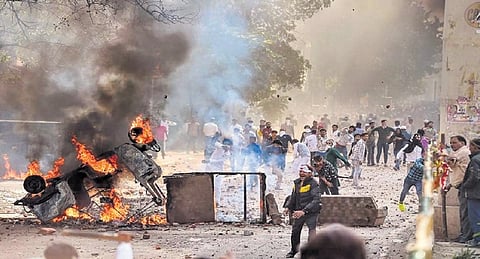

NEW DELHI: Former Aam Aadmi Party (AAP) councillor Tahir Hussain argued in a Delhi court on Friday that WhatsApp chats presented by the Delhi Police as evidence do not suggest he incited violence during the 2020 Northeast Delhi riots.
Hussain’s counsel questioned whether a “chakka jam” (road blockade) qualifies as an act of terrorism, emphasising that the chats did not promote violent actions.
The arguments were made before Additional Sessions Judge Sameer Bajpai during a hearing to determine if charges should be framed against Hussain and other defendants accused of orchestrating a “larger conspiracy” in connection with the riots that tragically resulted in over 50 deaths and left hundreds injured.
Hussain’s advocate argued that the WhatsApp messages cited by the prosecution only discussed peaceful protest strategies, noting there were no calls to use violence or confront law enforcement agencies. “Nowhere in these chats are people urged to take up arms against the government,” the counsel asserted.
The Delhi Police Special Cell, investigating the case, has relied on WhatsApp chats, witness statements and CCTV footage as evidence of an alleged conspiracy. According to the prosecution, the digital communications show an organised effort to intensify the unrest.
The court also considered Hussain’s October 25 statement, where he claimed that discussions on protests against the Citizenship (Amendment) Act (CAA) were neither insurgent nor violent in nature.
His counsel argued that participating in or discussing protests is within legal bounds and does not constitute terrorism. Hussain, alongside activists Sharjeel Imam and Khalid Saif, is among 20 people charged under the stringent Unlawful Activities (Prevention) Act (UAPA) and sections of the Indian Penal Code (IPC) related to terrorism, sedition and conspiracy.
The prosecution has claimed that these individuals were “masterminds” behind the February 2020 violence, which escalated communal tensions and resulted in 53 fatalities and over 700 injuries.